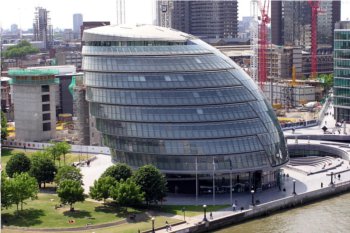Engineers say a new approach to funding is needed, including a review of road user charging, to ensure that London ‘gets the infrastructure it needs’.
The Institution of Civil Engineers (ICE) has published its Manifesto for London Infrastructure 2016, which sets out 10 recommendations for the next mayor and London Assembly and suggests £1.3tn of investment is needed in the capital by 2050.
These include a review of road user charges ‘with the revenue generated directed to infrastructure improvements’.

City hall: Is it ready to be radical?
Suzanne Moroney, ICE London director, said: ‘Tackling the core challenges of population growth and climate change, and retaining London’s position as a leading global city, requires long term commitment to its infrastructure. But this comes at a cost and £1.3tn over the next 35 years is a significant and challenging target.
‘Our industry, innovators and academics have a responsibility to help drive down costs through use of emerging technologies, but the next mayor must also be innovative and radical when it comes to securing new funding sources.'
Ms Moroney added: ‘We must also open up the “user pays” debate - a principle that is adopted across most infrastructure through utility bills and transport fares. Road user charging is a means of allowing a payback income stream for infrastructure investments, and when combined with effective management tools and technology, schemes can also help to reduce traffic and vehicle use.
‘We would like to see a review of road user charging conducted by the next Mayor to assess whether new charging zones or tolls are required, and how any future schemes could increase revenue for future transport projects.’
The ICE urges all mayoral candidates to commit to the 2050 London Infrastructure Plan, published by current mayor Boris Johnson and updated last year.
It says the next mayor should prioritise the development of Opportunity Areas 'that will ensure the delivery of housing stock through transport improvements', and the delivery of transport capacity upgrades on the London Underground, Crossrail 2 and the Cycle superhighway scheme.
But it raises concerns that projects within the plan, including transport projects, ‘come at a cost well beyond that which the Government can fund’.
Other recommendations include calling on the future mayor and Assembly to focus Transport for London’s investment on unlocking areas for housing, jobs and investment in the capital and supporting the Government’s final decision on the Airports Commission report.
ICE also recommended creating a regional forum for councils from London and the South East, building on the recent South East summits, to discuss key infrastructure issues and speak with one voice on issues such as Crossrail 2 and the National Infrastructure Commission.